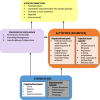Understanding the key processes of excellence as a prerequisite to establishing academic centres of excellence in Africa
- PMID: 33413297
- PMCID: PMC7792348
- DOI: 10.1186/s12909-020-02471-0
Understanding the key processes of excellence as a prerequisite to establishing academic centres of excellence in Africa
Erratum in
-
Correction to: Understanding the key processes of excellence as a prerequisite to establishing academic centres of excellence in Africa.BMC Med Educ. 2021 Feb 10;21(1):97. doi: 10.1186/s12909-021-02523-z. BMC Med Educ. 2021. PMID: 33568098 Free PMC article. No abstract available.
Abstract
Background: Africa's economic transformation relies on a radical transformation of its higher education institutions. The establishment of regional higher education Centres of Excellence (CoE) across Africa through a World Bank support aims to stimulate the needed transformation in education and research. However, excellence is a vague, and often indiscriminately used concept in academic circles. More importantly, the manner in which aspiring institutions can achieve academic excellence is described inadequately. The main objective of this paper is to describe the core processes of excellence as a prerequisite to establishing academic CoE in Africa.
Methods: The paper relies on our collaborative discussions and real-world insight into the pursuit of academic excellence, a narrative review using Pubmed search for a contextual understanding of CoEs in Africa supplemented by a Google search for definitions of CoEs in academic contexts.
Results: We identified three key, synergistic processes of excellence central to institutionalizing academic CoEs: participatory leadership, knowledge management, and inter-disciplinary collaboration. (1) Participatory leadership encourages innovations to originate from the different parts of the organization, and facilitates ownership as well as a culture of excellence. (2) Centers of Excellence are future-oriented in that they are constantly seeking to achieve best practices, informed by the most up-to-date and cutting-edge research and information available. As such, the process by which centres facilitate the flow of knowledge within and outside the organization, or knowledge management, is critical to their success. (3) Such centres also rely on expertise from different disciplines and 'engaged' scholarship. This multidisciplinarity leads to improved research productivity and enhances the production of problem-solving innovations.
Conclusion: Participatory leadership, knowledge management, and inter-disciplinary collaborations are prerequisites to establishing academic CoEs in Africa. Future studies need to extend our findings to understand the processes key to productivity, competitiveness, institutionalization, and sustainability of academic CoEs in Africa.
Keywords: Africa; Centre of excellence; Excellence; Higher education; Participatory leadership.
Conflict of interest statement
The authors declare that they have no competing interests.
Figures
References
-
- African Union Commission . Agenda 2063: the Africa we want. Addis Ababa: African Union; 2015.
-
- African Union . On the ings of innovation: the AU science, technology and innovation strategy for Africa 2024, 2024 strategy (STISA-2024) Addis Ababa: AU; 2014.
-
- Juma C. Education, research, and innovation in Africa: forging strategic linkages for economic transformation, discussion paper. Cambridge: Belfer Center for Science and International Affairs, Harvard Kennedy School; 2016.
-
- World Bank Group . ACEII - the eastern and southern Africa higher education centers of excellence project. Washington, D.C: World Bank Group; 2016.
Publication types
MeSH terms
Grants and funding
LinkOut - more resources
Full Text Sources
Other Literature Sources
Research Materials



